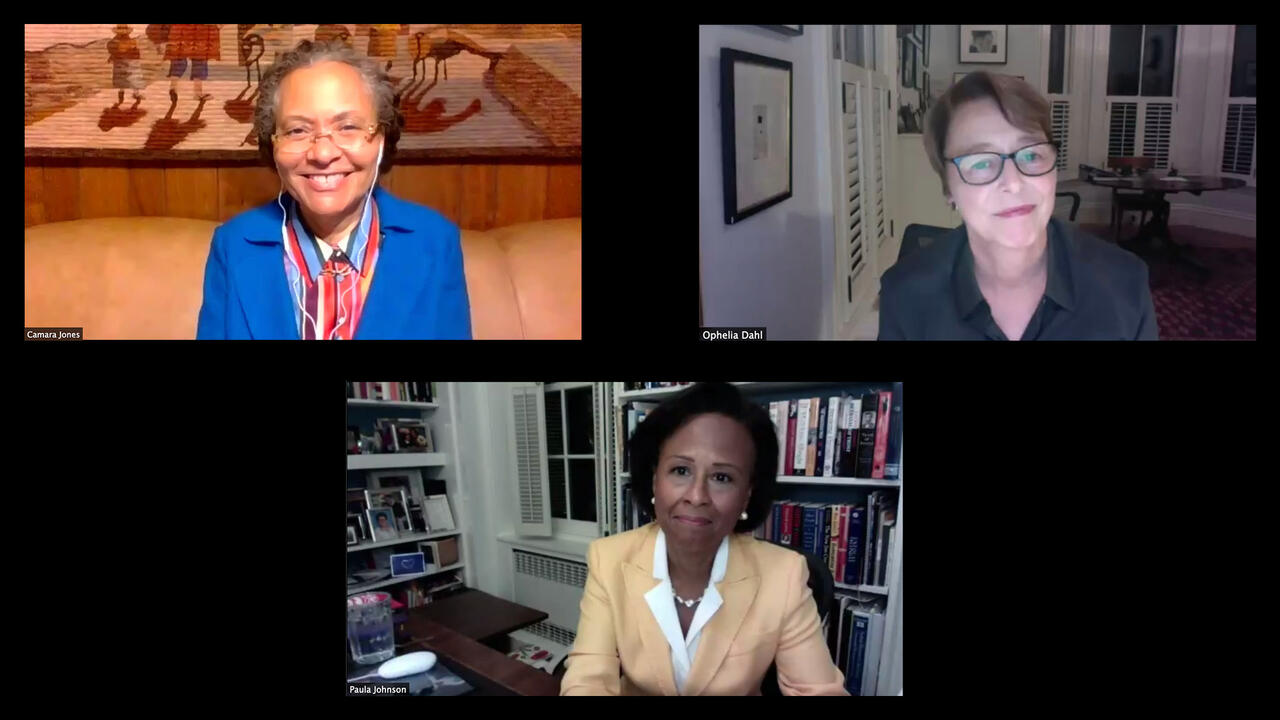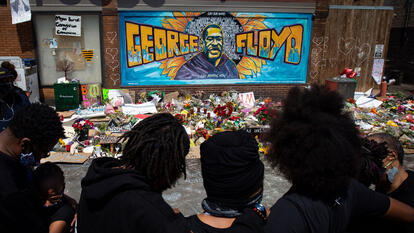
Wellesley Hosts Discussion on Racial and Global Disparities in COVID-19
Wellesley President Paula A. Johnson joined Ophelia Dahl DS ’94, co-founder of Partners In Health, and Camara Jones ’76, senior fellow at the Satcher Health Leadership Institute and Cardiovascular Research Institute at Morehouse School of Medicine, on September 8 for a webinar about the racial and global disparities COVID-19 has revealed.
Johnson started the conversation by asking about the most significant lessons we are learning from this pandemic. Jones said it has illustrated that we do not live in a society of equal opportunity. “So COVID-19 just kind of pulled the sheets, if you will, off of structural racism in this nation,” she said. “It’s not that people of color, it’s not that Black people, and Indigenous people, and Latinx people, and Pacific Island people, it’s not that we are more susceptible to the virus. It is that we’re more likely to get infected because we’re more exposed and less protected. And then once infected, we’re more likely to die because we’re more burdened by chronic diseases with less access to quality health care. And each of those things, in turn, has its roots in how opportunity is structured and value is assigned in this country based on race.”
Dahl added that we’ve learned our health system “is not up to the task of facing a pandemic,” and even the clinicians she works with have been surprised by how “woefully inadequate our system is.”
To address inequity in health care, Jones said, we need to value all individuals and populations equally and include their voices when making decisions that concern them. She also noted that the United States has a tendency to treat the present as though it’s disconnected from the past. “We need to learn our full histories; we need to learn our local histories. And once we learn the histories, we need to rectify them,” she said.
“COVID-19 just kind of pulled the sheets, if you will, off of structural racism in this nation.”
Camara Jones ’76
Johnson asked Dahl what the United States could learn from other countries. Dahl said we need to invest more in the most vulnerable populations, and in public health generally. The countries that have been more successful in handling the pandemic, she said, “have looked at an approach that links taking care of patients with testing with contact tracing. And with quarantine. And, you know, the kicker there is making sure that those people that you’re asking to quarantine have support to do so.”
The three discussed how individualism in the U.S. may be a hindrance to caring for the collective, which is needed when living through a pandemic. Dahl said a community-based approach to health care in this country could address some of the inequities in the current system. “If it was really, truly community based, then it would be a human rights-based approach,” she said. Jones said this country has been centered on the individual in handling the pandemic and has completely missed the public health approach, by testing people already showing symptoms, and never progressing into randomized testing, contact tracing, or quarantining on a federal level; trying to send children back to school because they aren’t likely to get sick from the virus, although they can be vectors in the community; and focusing on vaccines rather than on proven public health strategies like wearing a mask, washing hands, and paying people to stay home. “We are not about the ‘we,’ the collective…that my self-interest is bound up with your self-interest, and we’re all in this together. We’re not about that at all, and it is killing us,” Jones said.
Jones asked Dahl what it would take to move the U.S. toward a community-based approach to health. “It would take more imagination, and it would take political will, and it would require people to rethink the system, a system that is inherently racist,” Dahl said, adding that it could certainly be done. “It’s not nearly as complicated as some of the things that we’ve tackled as a country. So, I think it’s a failure of imagination. I really do.”
After the public discussion, students in the Presidential Scholars civic leadership community spoke with Johnson, Dahl, and Jones in a separate video meeting. Deena Saadi ’22 said that the presentation made her feel tremendously energized. She said she is concerned about the health effects of climate change and asked, “How do we protect the health of our communities against what to so many people is invisible or even nonexistent?”
“If [health care] was really, truly community based, then it would be a human rights-based approach.”
Ophelia Dahl DS ’94
Johnson said climate change can bring together people who are focused on anti-racism and on women’s rights, because both issues are affected by climate change, and that combining efforts can “create a much more universal movement.” Dahl agreed. “I think that there has been, in the past, the tendency to say, you know, those people are interested in global health, and those people are interested in climate health, and those people are interested in combating racism, instead of realizing that these movements that have all been thought of as separate are utterly connected,” she said.
Dahl started Partners In Health when she was in her early 20s, and Akosua Boampong ’22, who plans to start a nonprofit rape crisis center in Ghana, asked her for some advice. “How did you mobilize a committed team, gathering and pooling resources?” Boampong asked. “How do you bring all those pieces together to work as efficiently and as effectively as you picture your vision to be?” Dahl said she didn’t have a business plan when she started, and that her success depended on the help she received from others she met and on making incremental moves toward their goals, like communicating the problem they were trying to address in a way that made others want to help.
The session ended with the speakers offering words of wisdom to this cohort of Presidential Scholars, who will work together on social change and leadership for the next two years. Jones told the students her “four BC’s”: Be courageous, be curious, be a citizen, build community. Dahl encouraged them to take intellectual risks. “The reward is not always apparent, except that, if you don’t and you stay in your comfort zone, you will lose out on many, many things,” she said.
Johnson advised the students to go forward without fear. “I do think fear, fear of failure, fear of not doing the right thing, fear of not studying that extra hour…I think sometimes it’s the fear that actually is so paralyzing,” she said. “The fact that you’ve made a commitment here is very powerful, and just go with it and see where it leads you.”

